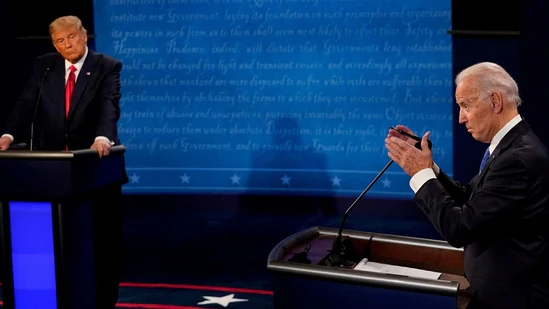Trump can’t handle the foreign policy debate America needs
I’m bracing myself for the cringefest of oversimplification, misrepresentation and outright mendacity that Americans call a presidential “debate.” Pundits will declare either Joe Biden or Donald Trump the winner. But some of the losers are already clear. They include the muses of nuance, insight and intellectual honesty.

Let’s concentrate on just one topic: foreign policy. The world, as pretty much everyone in it will have noticed, has fallen into disorder. Russian President Vladimir Putin is trying to annihilate the statehood of a sovereign country, Ukraine. Sudan and Myanmar each descended into yet another civil war. Hamas terrorized and brutalized Israel, and Israel then bombed the Gaza Strip into rubble. The Houthis are disrupting global trade. China is harassing the Philippines and threatening Taiwan, while North Korea menaces the South. The list goes on.
Because these events happened on Biden’s watch, Trump will blame them on his opponent. The insinuation is that a US president bears responsibility for anything that happens anywhere, and chaos abroad must be confirmation of the MAGA meme that Biden is “weak,” whereas President Trump was, and again will be, self-evidently “strong.”
To make this propaganda — for that’s what it is — work, the MAGA crowd cherry-picks timelines. They emphasize, for instance, that Putin annexed Crimea during Barack Obama’s term and went for the rest of Ukraine during Biden’s, but somehow stayed meek throughout Trump’s. The Middle East, in their telling, was heading toward peace during the Trump years, but once Hamas and its Iranian backers got a whiff of Biden’s weakness, they let slip the dogs of war. This is the sort of logic that Robert O’Brien, Trump’s former national security advisor, employs to claim that in a second Trump term “the United States would be strong, and there would be peace.”
The reality is that causes and effects are fiendishly hard to assign, and this kind of oversimplification distorts analysis enough to create the risk of disastrous policy choices in the future. That applies not only in geopolitics. Who exactly, for example, should get blame or credit for the economy or inflation? The current president, his predecessors, the chairman of the Fed, regulators, bankers or exporters in the US, or perhaps in China or the European Union? In international affairs, the linkages are especially complex, in part because we never have counterfactuals.
Take the etiology of Russia’s war of aggression. Putin, who witnessed the dissolution of the Soviet Union as a traumatized KGB agent, has held a vengeful neo-Tsarist grudge against Ukraine and other post-Soviet states for decades. If one American president stood out in setting him on a path to war, it was George W. Bush, who in 2008 cajoled his fellow NATO leaders into promising that Ukraine would become a member in the alliance, though without specifying when.
Obama made mistakes too. After Russia’s annexation of Crimea, he should have punished Putin much more severely. But the real blame at that time belongs to European leaders such as German Chancellor Angela Merkel, who insisted on playing Neville Chamberlain to Putin’s Hitler.
Trump, for his part, seemed to get on famously with Putin, even as the Russians kept fighting a quasi-war in the Donbas throughout his term. Their rapport, though, owed more to the adoration of a wannabe strongman (Trump) for his role model, and to Putin holding out for some sort of deal in his favor and at the expense of Ukraine and NATO. That, and therefore a Trump victory, is still what Putin is hoping for. Where does that MAGA guff about “strength” factor in this?
When Putin finally did order his troops into Ukraine, it was Biden’s gathering and sharing of intelligence that stymied his plans for a quick victory, and Biden’s leadership that rallied a fractious West to support Kyiv. Once Putin, knowing that his original plan had failed, began threatening nuclear escalation, moreover, it was Biden who delivered a private message that he would punish Russia with conventional but devastating military might if the Kremlin dropped a nuke.
You can tell a different narrative, of course. That is true about any world event, including the dissolution of the Soviet Union that so upset young Putin. A dominant (and in my opinion tenable) view in the US is that President Ronald Reagan deserves credit for showing an authentic kind of strength. The reigning assessment in places such as Germany is the opposite — that it was instead the diplomatic “rapprochement” by parts of the West toward the East, known as Ostpolitik, that softened up the Kremlin.
My colleague Minxin Pei, by contrast, argues that “it was the rise of Mikhail Gorbachev that directly contributed to the Soviet demise. Ironically, it was Reagan’s moderation after Gorbachev’s rise, not his continuing hardline policy, that did more to allow Gorbachev to continue glasnost and perestroika that destroyed the USSR from within.” This point is occasionally hard for Americans to grasp: Their role in world events is sometimes big but other times negligible, and in those instances wise policy involves letting things play out.
We shouldn’t “debate” foreign policy by letting candidates hammer each other with demagogic slogans. For it obviously still matters hugely who sits in the Oval Office when things blow up in distant places. What kind of temperament does a president have? And what sort of judgment, what kind of worldview, with what type of counsel from which advisers?
Trump’s partisans, when forced to elaborate on their meme about “strength,” extol The Donald’s alleged prowess at making “deals,” and even (O’Brien again) his “unpredictability,” which will apparently keep “Moscow off balance.” More probably, it will only frighten friends and foes into building or growing their nuclear arsenals while they can, while raising the risk of cataclysmic miscalculation by someone, somewhere.
Rhetorically, Biden has the tougher job in this debate. He has to defend his responses to world crises not seen in this density since the 1930s or the early Cold War.
This involves reassuring friends, deterring foes, persuading neutrals, intervening when necessary and preventing escalation where possible. It requires finesse, intellectual humility, openness to good advice and a quiet resolve that doesn’t need to prove itself. All this, alas, is hard to convey in sound bites, and on the kind of stages that American democracy makes available
Disclaimer: The copyright of this article belongs to the original author. Reposting this article is solely for the purpose of information dissemination and does not constitute any investment advice. If there is any infringement, please contact us immediately. We will make corrections or deletions as necessary. Thank you.
Title:Trump can’t handle the foreign policy debate America needs
Url:https://www.investsfocus.com



